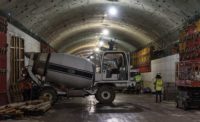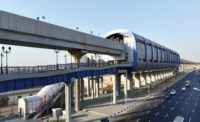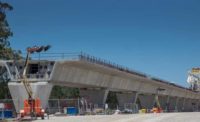International firms are gearing up to start phase two of Sydney’s new metro system, which includes the recent completion of Australia’s longest tunnels. At $15 billion, the 66-kilometer-long metro represents the country’s largest transportation investment so far.
Trains are due to start running on the 36-km north-west phase, between Rouse Hill down to Chatswood, in about two years. The $6.2-billion line includes 15 km of twin tunnels and the country’s longest bridge, the 4-km Skytrain viaduct.
With north-west civil construction largely done, Transport for New South Wales (TfNSW) is procuring the $8.5-billion to $9.3-billion, 30-km southern extension to Bankstown. Due for completion in 2024, it will include 15.5 km of twin tunnels, to Sydenham from Chatswood under the central business district and harbour.
The first of five tunnel-boring machines is scheduled to start work on phase two next year, according to a TfNSW spokesman. Phase-one tunnelling ended early last year, when the last of four 6.99-meter-dia TBMs from France’s NFM Technologies S.A. broke through.
The CPB John Holland Dragados joint venture completed the country’s longest railroad tunnels 10 months early and within the $850-million value of the contract signed in June 2013, says a TfNSW spokesman.
Those twin tunnels run between Epping and Bella Vista, where the line rises on the Skytrain viaduct to Rouse Hill farther north.
Milan-based Salini Impregilo S.p.A. has nearly completed the multispan viaduct, including a 270-m-long, curved cable-stayed bridge at its north end. The contractor craned the first 29-m-tall steel cable pylon into place on the deck late this May and has since fitted the second one.
Valued at $252 million, Salini Impregilo’s design-build contract, which also includes another 390-m section of viaduct and 1.6 km of at-grade work, started in December 2013. The value rose to about $290 million in 2015 to cover land cleanup, says TfNSW’s spokesman.
But the price increase does not include the cost of remedying last September’s compression failure of a joint between two precast segments on one of the viaducts roughly 39-m spans, adds the spokesman.
The viaduct was built using match-cast segments, placed span by span. But at one location, the segments were out of sequence, compelling the contractor to make a cast-in-place joint with cement grout, according to a report for TfNSW by Aurecon Australasia Pty. Ltd. (ENR.com 2/24/17). Among reasons for the joint failure, the report cited inadequate grout.
Salini Impregilo referred all questions to the owner. The contractor is bearing the cost of the incident, and the contract remains on schedule, says TfNSW’s spokesman.
To upgrade and equip phase one’s southern 13 km to Chatswood, build eight stations, supply trains and operate the phase-one line for 15 years, TfNSW awarded a $2.7-billion public-private-partnership contract to Northwest Rapid Transit (NRT) in September 2014.
NRT includes Hong Kong’s mass transit operator MTR Corp. as well as a number of contractors and financial institutions. The partners will contribute more than $1.3 billion of financing, including $1.2 billion of senior debt plus equity. The consortium will recoup its investment though performance-based payments.
NRT’s contract can be extended to cover the second phase, subject to negotiations, says TfNSW’s spokesman. With that decision still to be made, the fixed price, lump-sum design-build contract for phase two’s 15.5-km twin tunnels and six underground stations are due for award within months.
John Holland Pty. Ltd., CPB Contractors Pty. Ltd. and Ghella Pty. Ltd. form one bidder. The contending team includes Ferrovial Agroman (Australia) Pty. Ltd., Acciona Infrastructure Australia Pty. Ltd. and BAM International Australia Pty. Ltd.
To help with this work, TfNSW in May appointed San Francisco-based Bechtel Inc. as its delivery management partner. The team will be led by Ailie MacAdam, who had a similar role on London’s vast Crossrail project and leads Bechtel’s global railroad work.
MacAdam plans to transfer her Crossrail experience to the Sydney metro, which, she adds, is providing Bechtel with a toehold in Australia’s promising infrastructure market.








Post a comment to this article
Report Abusive Comment